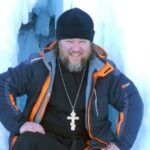It is good to know that pastors and even entire congregations are becoming Orthodox in the US, other countries, and in Russia. The website Pravoslavie published an interview with a former Protestant pastor, Father Igor Zyryanov, who led his congregation into Orthodoxy. What I found striking about the article were the insights and anecdotes that can teach us how to do Orthodox outreach and how not to do Orthodox outreach. This is a very instructive and practical article. Read the whole article.
Taking it Slow
Because Protestantism is so different from Orthodoxy, it is advisable that inquiry into Orthodoxy be gradual. A take-it-slow approach can be quite fruitful. Oftentimes, converts will bring with them their family and even their congregation into Orthodoxy. One well-known instance of mass conversions is the reception of some two thousand American Evangelicals in 1987. Their journey to Orthodoxy took about five to ten years of careful study and visiting Orthodox churches. A rushed conversion can lead to missed opportunities. Father Zyryanov recounts:
Often priests who bring Protestants into Orthodoxy are in a hurry. They relate to Protestantism as to an enemy movement, and try to yank a person out of it abruptly. This is not always beneficial. For example, if a pastor starts thinking about Orthodoxy, the whole community may become Orthodox. But the priest to whom the leader has turned tries to convince him to receive Orthodoxy quickly. The pastor follows his advice, becomes Orthodox, and… looses [sic] his authority among his parishioners who have not had the chance to understand anything yet. The leader is kicked out of the congregations, and the parish receives a vaccination against Orthodoxy.
In our case, thank God, this did not happen. Fr. Viacheslav Pushkarev, the head of the missionary department of the Irkutsk diocese, was in no rush when he began to meet with us. He came to our meetings with lectures, allowed the whole community to understand Orthodoxy, to literally be permeated with it. Therefore we were all able to come into the Russian Orthodox Church, and we didn’t lose anyone.
As Father Igor noted, it is a mistake to think of Protestantism as an “enemy movement.” Behind what comes across as hostility is a sincere desire to defend right doctrine. Many Protestants have been brought up in a milieu of theological debates and bible memorization. Behind the outward aggressiveness is often an inner hunger – the unspoken sense that there is something more to the Christian life than bible study, intercessory prayer, simplistic praise songs, and evangelism. One thing many Evangelicals and Protestants are hungering for is the deep worship of the Liturgy and receiving Christ’s body and blood in the Eucharist. Another is doctrine rooted in historic Christianity that traces back to the Apostles. Also, many are hungering for a radical spirituality like that exemplified by the Desert Fathers.
My journey to Orthodoxy was a gradual one that took about seven years. I needed the time because I had much to unlearn. When I did become Orthodox, I did so with assurance and confidence that I was entering into the Church founded by the Apostles. For a Protestant, it is a costly sacrifice to give up long-held doctrines. That is why Orthodox outreach requires considerable patience and sympathy.
Becoming Orthodox is more than a matter of learning new doctrines. One learns an approach to prayer and worship quite different from Protestantism, and a physical approach to holiness – fasting and prostrations – that informs the Orthodox way of life. Probably, one of the hardest things for a Protestant to learn is humility and obedience to Orthodox priests. These important lessons are not learned overnight but gradually, over months and even years. Thus, taking it slow is usually good advice for Protestant inquirers.
Debates Not Helpful
The best approach for Orthodox outreach is friendly dialogue, not competitive debates. One time I got into a debate with some members of a Calvary Chapel church in Hawaii. For about two hours we had a friendly give and take, going from one bible passage to another. While exciting and even fun, I came to the conclusion that it was a waste of time. It wasn’t fruitful because the timing wasn’t right. One needs to be ready to hear another point of view and ready to consider changing one’s views. Looking back on my past experience debating with Evangelicals, I can sympathize with Father Igor’s observation:
—And what about debates with Protestants, which were popular at one time?
—I think that this format is untenable. Let’s say we have a public debate and we win, while the Protestant leader loses. He is humiliated and insulted, and it’s highly unlikely that he’ll become Orthodox. If the Orthodox side didn’t have sufficient knowledge or good enough arguments and lost the debate, he has brought shame upon Orthodoxy. In both cases we have a fiasco.
Only the Holy Spirit can prepare people’s hearts and minds. Our role is to be there as humble servants helping those who want help. So now, when I meet a Protestant asking questions about Orthodoxy, I try to discern if he or she is genuinely open to Orthodoxy and if there is a spiritual hunger behind their questions. If they just want a debate, then I take a pass on that. But when I do meet an inquirer who might become Orthodox but has a hard time letting go of certain Protestant teachings, I will present a clear and pointed critique drawing on Scripture, church history, and the Church Fathers. This is for the purpose of helping a struggling inquirer, not for putting down a theological rival.
Slamming the Door in Someone’s Face
Orthodox outreach is everyone’s job, not just the priest. Every member of the local parish can affect Orthodox outreach for good or bad. Not too long ago, I met a man who came to the local Greek Orthodox parish for a class assignment. This being his first time at an Orthodox church, he was understandably nervous. He arrived during Matins and was wondering if he was even at the right place, because it looked like no one was there. Finally, the lady manning the candle stand opened the door and asked: “Do you want to come in?” This was a tiny gesture but a very significant one.
Father Igor relates a painful incident in which the opposite attitude was displayed.
One woman, a third generation Baptist, started thinking about Orthodoxy, came to a church and asked the grandma at the candle desk if she could speak with a priest. The grandma said, “Are you even baptized?” The woman answered that she wasn’t. The old lady told the woman off, saying that batiushka would not even talk to her in that case. The woman did not give up after one try, and wrote to our center. Finally she met with a priest in another church. And this is not an isolated incident, unfortunately.

The Anarchist with a Green Mohawk Source
Orthodox Christians need to be prepared to welcome all kinds of people, some who look like us as well those who look different. On several occasions, I have heard from inquirers about how they felt unwelcome when they visited an ethnic parish. Another challenge can be welcoming visitors who look outwardly very different, e.g., wearing black Goth-style clothing or bearing a heavily tattooed body or sporting a bright green Mohawk.
Orthodox priests need to remind parishioners that they too have a role to play in Orthodox outreach and that the Orthodox Church is not confined to one particular ethnicity but is a house of prayer for all nations (Mark 12:17). For example, outreach can take place during the coffee hour following the Liturgy. If a first-time visitor is not welcomed within the first few minutes, they will likely leave thinking that Orthodoxy is unfriendly and uncaring – a rejecting religion! So, if you see someone standing by themselves during the coffee hour, excuse yourself from your friends, and introduce yourself to the visitor. A short friendly conversation can be a life changing event for the visitor. The purpose of your introducing yourself should not be to debate, but simply to be friendly and welcoming. Perhaps setting the stage for another conversation later . . . maybe even later that same week over coffee!
Orthodox Christians should have in mind the Parable of the Prodigal Son (Luke 15). Protestant inquirers are often like the Prodigal Son yearning for home. The son in the parable was lucky the father saw him in the distance and came running to greet him. The elder brother had a harsh, judgmental attitude and the story would likely have a quite different ending if it had been the elder brother who greeted the returning Prodigal Son. Thus, the ordinary church member can sometimes be more important than the priest in Orthodox outreach. The parishioner is often the first Orthodox Christian a Protestant inquirer will meet. And many will make a judgment about Orthodoxy – for good or ill – based on the first encounter. Therefore, we should strive to treat all inquirers and visitors with courtesy and charity.
The Need for Nicodemus Ministry
There is a need for Nicodemus ministries, where interested pastors and other inquirers can meet in private. Quiet, discreet inquiry is necessary for pastors to do the needed study and spend time in prayer in order to make up their minds about Orthodoxy. It is hard for a pastor to make a firm, reasoned decision to convert if he is embroiled in theological debates and suspicion that he is betraying his ordination vows. Fr. Igor noted:
In order for a person to find the true faith many conditions are needed, which are first and foremost created by the Lord Himself. A small part of this work, by God’s grace, is ours. Many Protestants come to me, mainly ministers. There are those to want to meet and talk secretly. We go to meet with them, answer their questions, and tell them about our own experience.
It is not easy for a Protestant pastor to be an inquirer into Orthodoxy. It takes humility to admit that one’s theology may be wrong. Some pastors at their ordination have made solemn vows that they would inform the leadership if they no longer hold to the teachings of their denomination. So, for some pastors even a curious inquiry into Orthodoxy is very risky. It also takes considerable courage to be open to wrenching changes in one’s job situation. Another factor likely weighing on the minds of inquiring pastors is how their wives, family members, and close friends will react. We need to be ready to respond, not just to theological questions about Orthodoxy, but also to practical questions about how to make the transition into Orthodoxy.
It would be good if an Orthodox priest is knowledgeable about the Bible and Protestant theology, but oftentimes an Orthodox priest may not have that background. My advice to Orthodox priests who feel unprepared to meet with a Protestant pastor interested in Orthodoxy are: (1) become acquainted with brother priests who have converted from Protestantism, (2) read helpful books like Fr. Josiah Trenham’s Rock and Sand or visit blogs like the OrthodoxBridge, (3) be humble admitting you don’t know the answer, and (4) don’t ignore the question – do your best to refer them to someone who can assist the inquirer. By being willing to treat a difficult question seriously you treat the Protestant inquirer with dignity and respect. Orthodox outreach is fundamentally team work. Another possibility are closed FaceBook groups where inquirers can ask questions and voice their concerns about Orthodoxy. Such groups do exist, however joining these group usually require a personal connection to ensure confidentiality. With our different gifts and backgrounds, we complement each other and build up the Church.
Orthodoxy’s Rich Spiritual Treasures
The word “evangelism” comes from the Greek word “εὐαγγέλιον” which means “good news.” When we come across a great restaurant or see a outstanding movie, the natural reaction is to tell others about it. In the case of Orthodoxy, when we encounter the richness of Orthodoxy we will be eager to tell others about it. The treasures of the Orthodox Church consist of its prayers, the wisdom of the Church Fathers, the example of the saints and martyrs, icons, and chants. We should not be reluctant to let non-Orthodox know about these treasures. A Protestant will often find the quote from a Church Father or an icon of Christ exotic and intriguing, sparking a desire to learn more. The fact that our Sunday worship goes back to the fourth and fifth centuries will attract Protestants. Even the beeswax candle we light upon entering the church will strike some Protestants as exotic and daring. Father Igor notes:
Clergy who are involved in missionary activities in a Protestant milieu should make contact with pastors who are open to having contact. It is helpful to tell them about the faith, to suggest some patristic reading. In this case the whole community will have the opportunity to understand the beauty of Orthodoxy, to know what the Church is. I think that after this the majority of the members of the congregation will receive Orthodoxy. There simply can be no other outcome for a Protestant who sincerely seeks God. Having learned the facts about the Orthodox Church, about the Sacraments, about apostolic succession, a person simply cannot remain a Protestant.
Father Igor’s advice reminds me of the ice cream shop where the server hands out tiny spoons with samples. At first, you may have some reservations, but usually trying out the unfamiliar flavor will win you over, and you end up buying a scoop. Needless to say, a smiling, encouraging server behind the counter makes a difference in your decision to step into the shop and try out the unfamiliar flavors.
A Window of Opportunity
We are living in a period that can be considered a window of opportunity for Orthodox outreach. Our attitudes will affect the way we relate to inquirers. Effective Orthodox outreach requires the conviction
• that Christ came to seek and save the lost,
• that in Orthodoxy we have a rich and priceless heritage,
• that the Orthodox Church has the fullness of the Faith,
• that many people are spiritually hungry but do not know where to look, and
• that we ought to be open to all kinds of seekers: some who look like us and others who look very different and scary, e.g., heavy metal rockers covered with tattoos or anarchists with a green mohawk. Let us remember the words of Christ: “I was a stranger and you welcomed me.” (Matthew 25:25; RSV)

Welcome to our church! Source
Let us open doors, not close them. We ought to welcome visitors to our church. Let us tell people: Come in and see!
Robert Arakaki
LINKS
“WELCOME HOME: The Story of the E.O.C.”
“I UNDERSTOOD: EITHER I GO WITH CHRIST OR I DIE: Interview with Igor Kapranov, former vocalist of metalcore band, ‘Amatory’.” Pravoslavie 16 January 2016
“THE ANARCHIST WITH THE GREEN MOHAWK: A story of one soul’s healing on the Holy Mountain.” Pravoslavie 9 January 2017
“FROM PASTOR TO PRIEST: Priest Igor Zyryanov on Protestantism and Orthodoxy.” Pravoslavie 30 April 2018
Interested Protestant Pastors may contact the following:
Missions and Evangelism Department of Antiochian Orthodox Christian Archdiocese




Thanks for linking to the Fr Igor interview. With a few small differences, his conversion experience was very similar to mine. Glory to God!